Choral Review
Vox Musica
Fragility of Goodness - March 1, 2020
Vox Musica is a unique women’s chorus, unique for the variety of music they present, all performed to the highest artistic standards. I have attended 16 of their concerts over the past 8 years, and I grieve for the concerts I had to miss. Founder and director Daniel Paulson has an extraordinarily wide appreciation of every form of choral art, and he is driven by (1) an appreciation of all cultures and (2) a passion for community and collaboration. Over the years I’ve heard Vox Musica concerts (a) that have featured a variety of local instrumental artists and composers, (b) that have been devoted to the music of other cultures (Indian/Persian, Greek/Russian Orthodox, Jewish, Native American), and (c) that have broken new boundaries, such as exploring electronic enhancement of women’s choral music. Like every Vox concert, the one I attended on this late Sunday afternoon was a completely new experience.
This concert (the second of two) was a presentation of the folk music
of Bulgaria and Georgia in collaboration with the Zado Eastern European
Vocal Ensemble, and Tzvetanka and Ivan Varimezov. Zado is a 9-member,
Sacramento-based group that specializes in Bulgarian folk dancing and
singing. Find more about them in their website:
www.zadosings.org. Only the 6
women of the group participated in this special concert series. For more
information about the Varimezovs (more properly, Varimezovi), check out
their Facebook page at
this link. Natives of Bulgaria, they teach in the UCLA Department of
Ethnomusicology and have been featured performers at concerts throughout
the West and beyond.
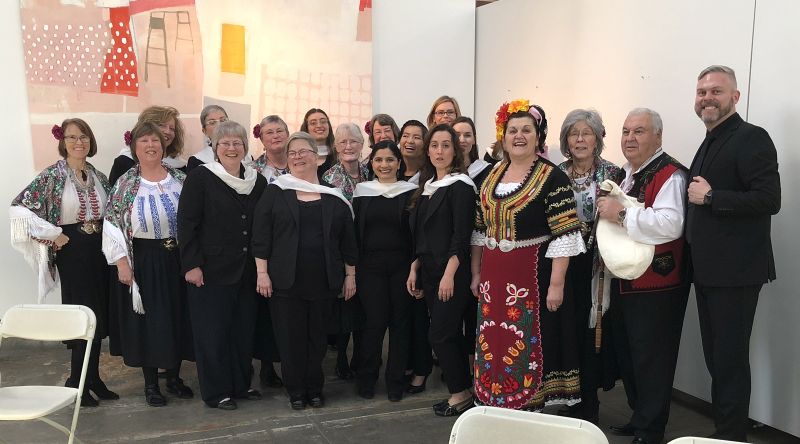
The first half of “Fragility of Goodness” featured the folk music of Bulgaria; the second half, that of Georgia. An excellent summary of these two music traditions was in the announcement of this concert in the Vox Musica website. I’m concerned that it will be gone at the end of the current season, so I’ve copied the text at this link.
I’ll confess that from the first moment I heard it, I was intrigued by the title of this concert: “Fragility of Goodness.” The document linked above recounts the tragedies experienced by both these countries over centuries. And after introductory comments by Daniel Paulson, Zado director Jan Volkoff spoke of her feelings about how the Balkans were impacted by the Holocaust. I began to see that the “goodness” at the heart of humanity is expressed in folk music. And the fracturing of society and release of some of the worst passions ― sadly characteristic of our contemporary world ― is what makes this goodness fragile. But it is in the music, passed from generation to generation, where that goodness reliably survives ― for all its fragility.
(Click here to open the program in a new window.)
Along this line, I suggest you take a good look at the program that was provided for the audience. The detail is remarkable. Besides the background information on each Vox singer, on the Zado organization, and on the Daniel Paulson and the featured guests, the information provided for each song is unusual. Next to the transliteration of each title is the original title with original orthography. The words of each piece are in the original language, in transliteration, and in translation. The region associated with each song is noted. And for each, there is background on the composer, the cultural context of the song, and – very often ― relevant history of the society. Call this erudite if you wish, but I was fascinated to read as much as I could before the concert, and what I read greatly enhanced my appreciation of what I was about to hear.
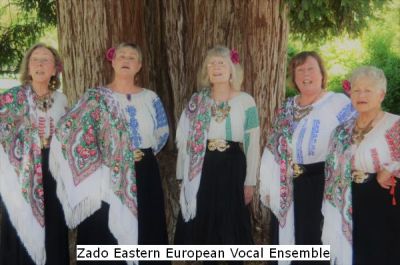 The
program also emphasized the idea of “goodness” in a creative way. Next
to the title and key information on each song was a column headed by the
words “Fragility of.” And in that column and opposite each song was a
word encapsulating the particular “goodness” that song expressed: love,
freedom, peace, kindness, etc. Elaborating on this theme were two sets
of charts (one set for each half of the concert) in a corner of the
room. One chart repeated the graphic of the program with brief lyrics;
the other gave a map, quotations, brief history and more lyrics to
illustrate a few of the “goodnesses.”
The
program also emphasized the idea of “goodness” in a creative way. Next
to the title and key information on each song was a column headed by the
words “Fragility of.” And in that column and opposite each song was a
word encapsulating the particular “goodness” that song expressed: love,
freedom, peace, kindness, etc. Elaborating on this theme were two sets
of charts (one set for each half of the concert) in a corner of the
room. One chart repeated the graphic of the program with brief lyrics;
the other gave a map, quotations, brief history and more lyrics to
illustrate a few of the “goodnesses.”
The concert began when a single member of Zado took a position at the
back of the stage and began to sing “Dumaj Zlato.” After a few measures,
the solo was taken up by another singer standing at the right side of
the room. Then a few more measures and the solo went to a singer on the
left side of the room. Then back to the first position with two singers.
The rotating went on with added singers until the 19 women in both Vox
Musica and Zado were singing together. Their tone was beautiful and
their pitch absolutely precise as they sang in what I thought was
eventually 2-part harmony. It was clearly folk music, repetitive, but
with many subtle variations that made it interesting and satisfying. And
the effect, for me at least, was soothing, almost mesmerizing.
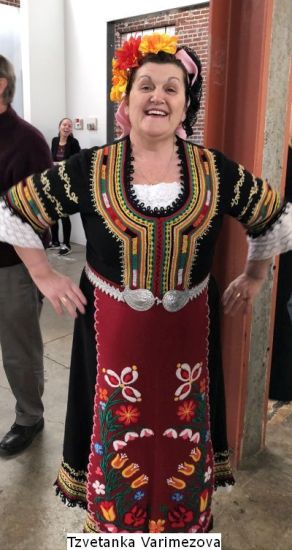
The next piece was introduced by the offstage sound of the gaida (a Balkan bagpipe). Tzvetaknka Varimezova proceeded to the stage singing “Gorice Sitna Zelena,” with her husband, Ivan Varimezov, following several feet behind with his gaida. The unusual sound of the gaida and the distinctive format of this Bulgarian song, made it feel like an authentic cultural experience for all of us in the audience.
With the Varimezovs having left the stage, the three groups of women, still in their widely separated positions, performed “Što Si Goro.” It felt like either 3- or 4-part harmony: the music was delicate and the singing restrained. I was sitting at the back of the left section of seats, and it was my great good fortune to have one of these semi-choruses right behind me. Enveloped in the exquisite singing of these women, I was in choral music heaven. And of the traditional Bulgarian music they sang, I wrote in my notes: “How could you not love this music?”
For the next selection, “Trendafilčeto, Karamfilčeto,” all the women assembled in a circle to perform a piece that was full of energy and distinctive Bulgarian harmonies. It was made even more exciting (and authentic) by an obbligato from Tzvetaknka Varimezova. As they sang, I noticed that the women from Zado were singing from memory (as they did throughout the concert), while the Vox singers had scores in front of them. Of course they would! It would have been an awful lot of music to memorize in completely unfamiliar languages.
At this point the choral singers exited, and the Varimezovs performed a series of folk songs. For the first of them, I could perceive a story being told ― with artistry and elegance. Presently they went to the onstage piano, and we had an unusual duet of gaida and piano with an extraordinary interplay of different rhythms. I watched Ivan Varimezov’s foot tapping as he played, and it struck me that this was music for dancing. If this were being performed in a square in a small town in Bulgaria, I bet listeners would have begun dancing spontaneously.
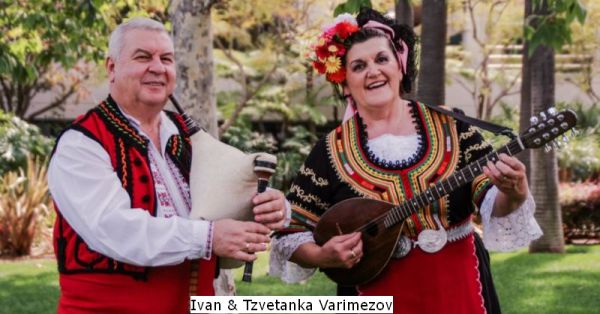 In
another song, Varimezova, played a tambura, an 8-stringed Bulgarian
instrument that seemed like it was related to the mandolin. These songs
featured combinations of both artists playing and singing, and it felt
like they were urging us to sing along. It occurred to me that that is
one of the unspoken essences of folk music. And maybe there were a few
Bulgarian-speaking people in the audience who were singing along! As
they finished, this suite of folk songs was rewarded by gracious, long
applause from the audience.
In
another song, Varimezova, played a tambura, an 8-stringed Bulgarian
instrument that seemed like it was related to the mandolin. These songs
featured combinations of both artists playing and singing, and it felt
like they were urging us to sing along. It occurred to me that that is
one of the unspoken essences of folk music. And maybe there were a few
Bulgarian-speaking people in the audience who were singing along! As
they finished, this suite of folk songs was rewarded by gracious, long
applause from the audience.
The next song, “Ergen Deda” was performed just by the Vox Musica ensemble, with a little help from Tzvetaknka Varimezova. Very different in character from the music that had gone before, it was an energetic piece, accented with hand-clapping. Described as a traditional piece, it seemed to have a contemporary sound, and that was confirmed by the arranger’s dates as noted in the program. Something else I think I noticed in the performance was that the Vox singers seemed to sing in a voice that had a mocking tone. If I’m correct in that, it would be consistent with the translation’s description of a clumsy grandfather, who was trying to dance with the young girls at the village dance. Not surprisingly, the word opposite this piece in the program was “laughter.” And again, if I surmise the intent of the singers and director to sing this foreign-language piece in a way that would be consistent with its message, it would be one more evidence of the great care taken by Daniel Paulson and his singers for authenticity in every detail of every concert.
Several of the songs in the second half of the concert were presented in a similar format: a trio of Vox singers performing a cappella. These were songs that were described as “healing songs” or in one case a lullaby. Indeed, they were gentle and melodic enough to make anyone feel comforted, perhaps all the way to better health.
Performed between these trios was a completely different piece from
contemporary Georgian composer, Ioseb Kechakmadze. “Exercise No. 1” is
described in the program as “a haunting, contemplative mix of dissonance
and ancient Georgian tonal harmonies, creating fascinating and
mesmerizing sound qualities from a choir.” The initial prolonged,
incredibly dense chord instantly reminded me of much of the progressive
music that I’ve heard from Vox Musica in the past. I couldn’t detect any
movement in the chord for the first 20 seconds. Then there was a growth
in volume and a change of vowels, but all on the same “chord”
― or so it appeared to me. Then there
was a decrease in volume, followed by a simultaneous raising of pitch.
Then there were plaintive sounds and ―
amazingly ― a switch to a “traditional”
chord ― then back. It got me thinking
that the human voice is ultimately an instrument with potential variety
rarely explored by choruses ― except
Vox Musica.
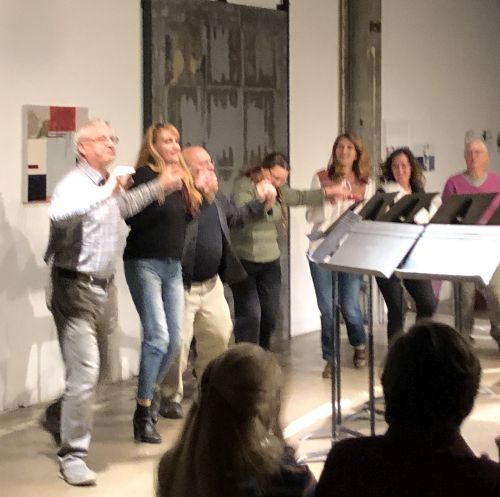
This “Exercise No. 1” was followed by a “Chorale” by the same composer. Performed completely with closed lips, it was a dramatic contrast to the previous piece and characterized by more traditional harmonies. Personally, I found it delicate, relaxing, and even perhaps comforting.
Another very different song was “Kirialesa,” described as a New Year’s song, and appropriately, it was joyful and rhythmic. It was performed by both ensembles, plus the Varimezovs, with the gaida, of course. Honestly, I lost track of where the first of these last two songs ended and the second began. But I noted Varimezova’s expressive, distinctive singing and the amazing vocal control of her trills. I also noted the gentle choral sounds and the beautiful, gentle weaving of harmonies. In my notes I wrote: “This is folk music, but it is something more: music that is soul-reaching, heart to human heart.”
Throughout this concert the audience had been responsive, but their enthusiasm was best gauged by the fact that at the close, every person rose immediately from their seats with extended applause. Then after Paulson consulted privately with the Varimezovs, she went to the piano and he began playing his gaida in a lively encore. The audience clapped in time and two dozen audience members, hands joined and arms held high, began a dance that circled around the performance space. Very few in the audience left before the dance was ended, with many erupting in cheers.
Note: Vox Musica posted 3 brief (1 to 2-minute) YouTube videos of a rehearsal of three of the songs in this concert, performed by both ensembles. The sound and video quality are excellent, and these clips will give you a good sample of the music enjoyed by the audience in this concert. Clip #1 – Clip #2 – Clip #3
Also, Vox posted a video in its Facebook page of the 42-minute first half of the Sunday evening concert. Again, both video and audio are quite good, and if you watch you’ll have a better view of the concert than I did. Click here to open the video.
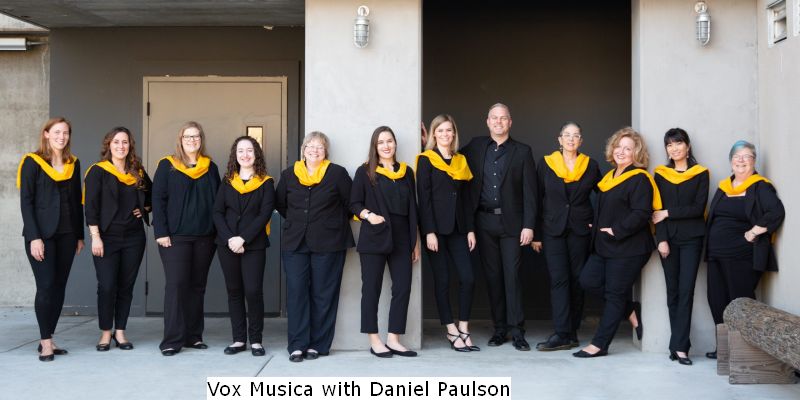
Keep track of future performances of Vox Musica by visiting their website: www.voxmusica.net.
Dick Frantzreb is editor of the Capital Region Performance Gallery. He also edits the Sacramento Choral Calendar and the Placer Performance Calendar, and he was a co-founder and past President of the Sacramento Valley Choral Coalition. He has been loving live performances in the greater Sacramento area and writing about them since 2012.